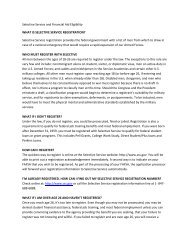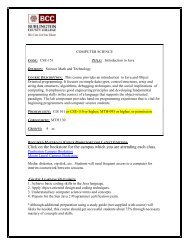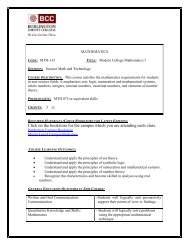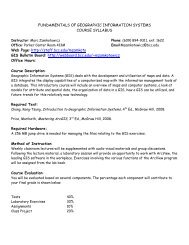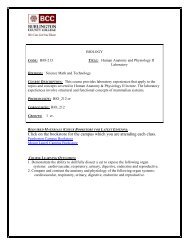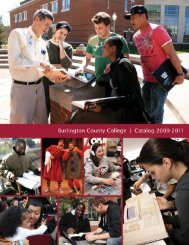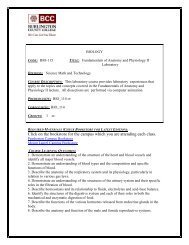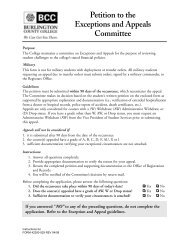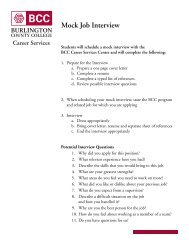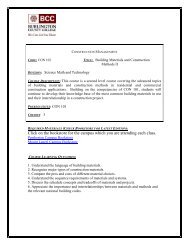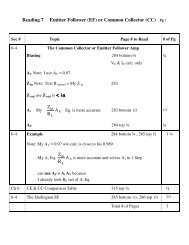Computer Science - Burlington County College
Computer Science - Burlington County College
Computer Science - Burlington County College
Create successful ePaper yourself
Turn your PDF publications into a flip-book with our unique Google optimized e-Paper software.
DMS 223 Clinical Practicum III 3 cr.<br />
This course was designed to develop the<br />
student’s ultrasonic skills in a diagnostic<br />
environment; may include scanning on<br />
campus laboratories, private office settings, as<br />
well as hospital rotations. Includes experience<br />
in abdominal, pelvic, obstetrical and small<br />
parts scanning.<br />
Prerequisite: DMS 206, DMS 222, DMS 225,<br />
MTH 107, SOC 101<br />
Co-requisite: DMS 207, DMS 226, PHI 101<br />
0/0/36 SP Course fee charged<br />
DMS 224 Sonographic Interpretations I 2 cr.<br />
This course will prepare the student for clinical<br />
practice and the registry exams. The student<br />
will hear lectures given by experienced sonographers<br />
and physicians on ultrasound related<br />
topics. The student will review case studies,<br />
testing his/her diagnostic skill in identifying a<br />
wide range of abnormalities.<br />
Prerequisite: DMS 102<br />
Co-requisite: DMS 205, DMS 211, DMS 221<br />
1/3/0 SU Course fee charged<br />
DMS 225 Sonographic Interpretations II 2 cr.<br />
This course will prepare the student for clinical<br />
practice and the registry exams. The student<br />
will hear lectures given by experienced sonographers<br />
and physicians on ultrasound related<br />
topics. The student will review case studies,<br />
testing his/her diagnostic skill in identifying<br />
normal anatomy, common variants and<br />
pathology. Student will present sonographic<br />
cases to the class for discussion.<br />
Prerequisite: DMS 224<br />
Co-requisite: DMS 206, DMS 222<br />
1/3/0 FA Course fee charged<br />
DMS 226 Sonographic<br />
Interpretations III 2 cr.<br />
This course will prepare the student for clinical<br />
practice and the registry exams. The student<br />
will hear lectures given by experienced sonographers<br />
and physicians on ultrasound related<br />
topics. The student will review a series of<br />
studies of ultrasound procedures, testing<br />
his/her diagnostic skill in identifying a wide<br />
range of abnormalities. Finally, the student will<br />
be required to take a series of registry-like<br />
examinations on each major area of study.<br />
Prerequisite: DMS 225<br />
Co-requisite: DMS 207, DMS 223<br />
1/3/0 SP Course fee charged<br />
Drafting and Design Technology<br />
DDT 103 Statics and Strengths<br />
of Materials 3 cr.<br />
This course focuses on the fundamental<br />
principles of structural design. It emphasizes<br />
analysis of structures to determine internal and<br />
external forces, the design of members and<br />
connections based allowable tension,<br />
compression, bending and shearing stresses,<br />
analysis of trusses, and the computerized<br />
study of forces as represented by vectors.<br />
Prerequisite: MTH 130<br />
2/2/0<br />
DDT 205 Structural Systems I 3 cr.<br />
This course applies the principles of statics and<br />
strength of materials to the analysis and<br />
design of structural steel, reinforced concrete,<br />
timber, and aluminum structures. Current<br />
specifications dealing with these materials are<br />
used. It also includes layout and detailing of a<br />
simple structure, as well as computerized<br />
beam selection.<br />
Prerequisite: DDT 103<br />
2/2/0<br />
Economics<br />
ECO 101 Fundamentals of Economics 3 cr.<br />
This course introduces the fundamental<br />
processes, language and analyses used in<br />
economics. It surveys major economic themes<br />
and issues confronting contemporary society<br />
to show the relationship between economics<br />
and the other social sciences.<br />
3/0/0 FA/SP<br />
ECO 203 Principles of Microeconomics 3 cr.<br />
This course focuses on basic economic<br />
principles with particular emphasis on microeconomic<br />
theory and problems. It covers<br />
graphs, supply, demand, the price system,<br />
resource allocation, distribution of income,<br />
socioeconomic problems, international trade,<br />
economic development, and comparative<br />
economic systems.<br />
3/0/0 FA/SP/SU<br />
ECO 204 Principles of Macroeconomics 3 cr.<br />
This course is an introduction to the economic<br />
institutions of our society. It focuses on supply,<br />
demand, business organization, income, social<br />
security, management-labor relations,<br />
taxation, money and banking, consumption,<br />
savings and investments. It applies these<br />
concepts and their interrelationships to<br />
problems such as economic activity,<br />
employment and unemployment, and<br />
inflation and public policies.<br />
3/0/0 FA/SP/SU<br />
Education<br />
EDU 105 Teaching as a Profession 3 cr.<br />
This course addresses the professional characteristics<br />
and historical development of<br />
teaching as a profession. It discusses the role<br />
of the teacher, lesson preparation, and other<br />
issues facing teachers. It also provides an<br />
overview of select teacher education<br />
programs.<br />
3/0/0<br />
EDU 112 Historical Foundations<br />
of American Education 3 cr.<br />
This course is a study of the historical and<br />
philosophical foundations of American<br />
education. It examines current trends and<br />
issues in education including but not limited<br />
to educational reform, diversity in the<br />
classroom, instructional approaches, and<br />
school effectiveness.<br />
3/0/0<br />
Electronics Engineering<br />
Technology<br />
EET 101 Introduction to Electronics 3 cr.<br />
This course explores the fields of electronics<br />
and computers for those who have no<br />
experience in these fields. It includes circuit<br />
components, Ohm’s Law, basic DC and AC<br />
circuits, an introduction to power supplies,<br />
transistor and integrated circuit amplifiers, and<br />
opto-electronic communications. Laboratory<br />
experiments cover these topics and verify<br />
lecture theory. The laboratory also introduces<br />
measurement techniques using a multimeter,<br />
function generator, oscilloscope, and<br />
computer operation using circuit analysis<br />
software.<br />
Prerequisite: High school algebra or MTH 075<br />
Note: EET 101 cannot be taken after passing<br />
EET 121<br />
2/2/0 FA/SP Course fee charged<br />
EET 111 Electronic <strong>Computer</strong> Graphics 3 cr.<br />
This course uses computer software to<br />
perform drafting related to the electronic<br />
industry. It covers electronic block diagrams,<br />
schematics, parts list, and production<br />
drawings. Printed circuit board design topics<br />
include layout, trace routing, assembly and<br />
hole drill drawings.<br />
2/2/0 Course fee charged<br />
EET 121 Circuits I 4 cr.<br />
This course focuses on the basic principles of<br />
direct and alternating current and on the<br />
properties of passive electrical components. It<br />
covers atomic theory, current, voltage,<br />
resistance, resistive networks, network<br />
theorems, work, power capacitance,<br />
inductance and transformers. Laboratory<br />
exercises include building circuits from<br />
schematics, using laboratory equipment to<br />
make measurements, and to verify theory.<br />
Circuit analysis software is used to simulate<br />
and verify the laboratory analysis where<br />
appropriate.<br />
Prerequisite: EET 101 or permission<br />
Co-requisite: MTH 130<br />
3/3/0 FA/SP Course fee charged<br />
EET 131 Solid State Devices 4 cr.<br />
This course introduces the characteristics,<br />
operation, and application of solid state<br />
devices including diodes and bipolar and MOS<br />
field effect transistors. It covers diodes, power<br />
supplies, the transistor switch, and DC and AC<br />
analysis of various types of amplifiers. These<br />
include the bipolar common-emitter,<br />
common-collector, power amps, and field<br />
effect transistor amplifiers. Laboratory<br />
experiments cover the course topics and verify<br />
lecture theory.<br />
Prerequisite: EET 121 and MTH 130<br />
3/3/0 Course fee charged<br />
To access outlines for these course descriptions, please visit http://www.bcc.edu/pages/476.asp<br />
154 <strong>Burlington</strong> <strong>County</strong> <strong>College</strong>



